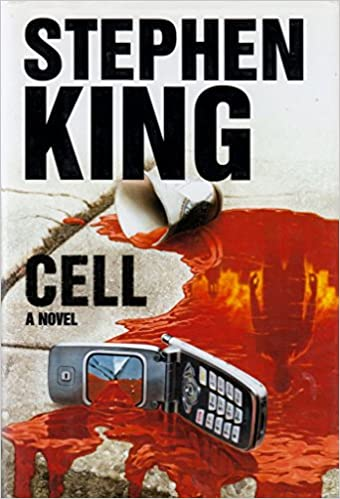|
March 2006
Cell
A Novel by Stephen King
Scribner 2006
350 pages
ISBN: 0743292332
 Life is good for Clay Riddell. He’s just signed a book contract to publish his graphic novels, and it seems that his long time hobby will finally become a career. So why not celebrate with a couple scoops of ice cream? As he stands in line at the ice cream truck, the woman in front of him talks on her cell phone. Two girls behind him do the same. Next thing he knows, Clay watches the woman attack the ice cream man as one of the little girls rips the woman’s throat out with her teeth. The world has just been doused with the Pulse, and everyone with a cell phone has become a blood-thirsty animal. Clay meets up with a man named Tom, neither of them having cell phones, and they take refuge together. They also pick up the young and traumatized girl named Alice and a boy computer wiz, Jordan. Together they must brave this aberration of a world full of flesh-eating monsters. Their task soon becomes more difficult when the “phoners” seem to adapt, and the group finds they are set apart for a very special death.
Life is good for Clay Riddell. He’s just signed a book contract to publish his graphic novels, and it seems that his long time hobby will finally become a career. So why not celebrate with a couple scoops of ice cream? As he stands in line at the ice cream truck, the woman in front of him talks on her cell phone. Two girls behind him do the same. Next thing he knows, Clay watches the woman attack the ice cream man as one of the little girls rips the woman’s throat out with her teeth. The world has just been doused with the Pulse, and everyone with a cell phone has become a blood-thirsty animal. Clay meets up with a man named Tom, neither of them having cell phones, and they take refuge together. They also pick up the young and traumatized girl named Alice and a boy computer wiz, Jordan. Together they must brave this aberration of a world full of flesh-eating monsters. Their task soon becomes more difficult when the “phoners” seem to adapt, and the group finds they are set apart for a very special death.
Stephen King returns full force to his horror roots in his novel Cell, and he makes no apologizes for the subject at hand. Cell is King’s take on Zombie lore, but he does well to acknowledge the work done before while moving the subject matter into original territory. The “phoners” or “phone crazies” are not the living dead, and their purpose for survival is much more complex than the need to consume human flesh. There is little cannibalism beyond the initial pages of Cell, and I must confess that I am grateful for that.
The characters of Cell are realistic and raw. Their emotions overpower them, as one would expect with the knowledge that many of their loved ones are either dead or reduced to mindless beasts. Thankfully, there are a few bright bulbs in King’s cast, and they theorize about the nature and origin of the Pulse. Jordan compares the human brain to a computer, and the Pulse to a worm virus that corrupts a computer’s hard drive, leaving nothing behind but the animalistic core that resides in humanity’s subconscious. The phoners evolve over the course of the novel, developing special powers such as telepathy, levitation, and the ability to link electronic communications together with their minds. King never explains how these abilities come to be, but none of the characters would be privy to that information. The reader must simply take it as so.
The ending of Cell should generate some controversy. I’ve read many Stephen King novels, and in my experience he provides a concise ending, making the story feel whole and complete. Even Dark Tower 7 had a clean ending that explained much of the previous books’ happenings. He answered all the questions even if you didn’t like it. Here, King leaves more questions unanswered than not. We learn nothing outside of what the main characters know, and none of them were insiders to the event, as we might expect. Even the resolution of Clay Riddell’s driving motivation is left unknown. Can he save his son, or is the boy lost to the curse of the Pulse forever? King teases us with a possibility and takes us to the edge, but he pulls us away from the cliff before handing out any parachutes.
Stephen King has always been a writer who cares about the journey more than the destination, and Cell has that journey feel of so many successful King novels. Many fans will enjoy his return to straight horror, and he certainly has not lost his touch for the grotesque. Cell is not for those of weak stomachs, and you may feel less inclined to carry around that fancy phone when you’re done.
|




